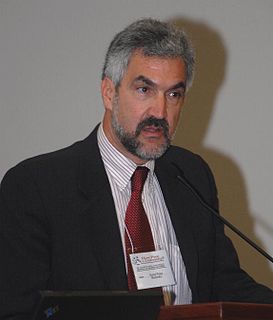Top 79 Hegemony Quotes & Sayings - Page 2
Explore popular Hegemony quotes.
Last updated on December 21, 2024.
Why is Netanyahu pushing war? Among several reasons, demonizing Iran reduces pressure on Israel to negotiate seriously with the Palestinians. Many Israelis prefer building Jewish settlements on Palestinians' land instead. Moreover, Israel's rulers oppose any development-such as an Iranian-U.S. detente-that could diminish Israel's U.S.-financed hegemony in the region. War with Iran would be a catastrophe all around. Netanyahu and his hawkish American allies-the same people who gave us the disastrous Iraq war and ISIS-must be repudiated.
What tends to happen when people talk about Chinese sci-fi in the West is that there's a lot of projection. We prefer to think of China as a dystopian world that is challenging American hegemony, so we would like to think that Chinese sci-fi is all either militaristic or dystopian. But that's just not the reality of it.
Every time we killed a thousand Bugs at a cost of one M.I. it was a net victory for the Bugs. We were learning, expensively, just how efficient a total communism can be when used by a people actually adapted to it by evolution; the Bug commisars didn't care any more about expending soldiers than we cared about expending ammo. Perhaps we could have figured this out about the Bugs by noting the grief the Chinese Hegemony gave the Russo-Anglo-American Alliance; however the trouble with 'lessons from history' is that we usually read them best after falling flat on our chins.
The United States has weakened itself with Iraq; Iranians feel victorious - they feel capable of filling the void. I think from the very outset the nuclear issue has been secondary to the more strategic outlook, in which the United States has, since 1991, pursued a policy that it cannot permit any country in the region to become too powerful and challenge American hegemony.
Empires are doomed. They become more diffuse, more broke, demagogues rule, and so I was just pointing out some similarities between past empires and what's going on right now. They all have had to apply more and more harsh rhetoric of superiority and divine right to justify the building of hegemony.
In fact, Clinton-era publications of the US Space Command describe control over space as a parallel to control over the oceans a century ago. Then, countries built navies to protect and enhance their power in commercial and strategic interests. Today, the militarization of space is intended to protect US investments and commercial interest and US hegemony around the world.
The government of the United States doesn't want peace. It wants to exploit its system of exploitation, of pillage, of hegemony through war. It wants peace, but what's happening in Iraq? What happened in Lebanon? Palestine? What's happening? What's happened over the last hundred years in Latin America and in the world?
Human beings are many-layered creatures, and do not succumb to the hegemony of others as easily as historians and politicians sometimes imply. Those Welsh, Scottish and Anglo-Irish individuals who became part of the British Establishment in this period did not in the main sell out in the sense of becoming Anglicised look-alikes. Instead, they became British in a new and intensely profitable fashion, while remaining in their own minds and behavior Welsh, or Scottish, or Irish aswell.
The hegemony of finance and the banks has produced the indebted. Control over information and communication networks has created the mediatized. The security regime and the generalized state of exception have constructed a figure prey to fear and yearning for protection—the securitized. And the corruption of democracy has forged a strange, depoliticized figure, the represented. These subjective figures constitute the social terrain on which—and against which—movements of resistance and rebellion must act.
For me, places are articulations of 'natural' and social relations, relations that are not fully contained within the place itself. So, first, places are not closed or bounded - which, politically, lays the ground for critiques of exclusivity. Second, places are not 'given' - they are always in open-ended process. They are in that sense 'events'. Third, they and their identity will always be contested (we could almost talk about local-level struggles for hegemony).
So many forces and resources would become available if States, aware (or conscious) of their true (or real) mission, would want to get on (or agree) to abolish every politics aiming at ("visant à", Fr.) expansion or hegemony; system that maintain among nations a a perpetual distrust and tension, impose on them (or force or compel, "leur impose", Fr.) formidable armies and crushing war budgets.
The history of mankind is a history of the subjugation and exploitation of a great majority of people by an elite few by what has been appropriately termed the 'ruling class'. The ruling class has many manifestations. It can take the form of a religious orthodoxy, a monarchy, a dictatorship of the proletariat, outright fascism, or, in the case of the United States, corporate statism. In each instance the ruling class relies on academics, scholars and 'experts' to legitimize and provide moral authority for its hegemony over the masses.
It can be said, truly said, that the Iraqi resistance is not just defending Iraq. They are defending all the Arabs and they are defending all the people of the world against American hegemony....It's not the Muslims who are sick. It's Bush and Blair and Berlusconi who are sick. It's not the Muslims who need to be cured. It's the imperialist countries that need to be cured.
There are insistent calls for autonomy, appeals for a new resource ethic based on the tradition of the commons, demands for the reinstatement of cultural primacy over corporate hegemony, and a rising demand for radical transparency in politics and corporate decision making. It has been said that environmentalism failed as a movement, or worse yet, died. It is the other way around. Everyone on earth will be an environmentalist in the not too distant future, driven there by necessity and experience.
Anti-Islamist Muslims - who wish to live modern lives, unencumbered by burqas, fatwas and violent visions of jihad - are on the defensive and atomized. However eloquent, their individual voices cannot compete with the roar of militant Islam's determination, money (much of it from overseas) and violence. As a result, militant Islam, with its West-phobia and goal of world hegemony, dominates Islam in the West and appears to many to be the only kind of Islam.
The ethical regime [of the Jews] was quite definitely Ptolemaic, revolving around the small group of Jews, not the larger Gentile group and, accordingly, they learned to remain unimpressed by Gentile temporal power. Being unimpressed did not mean being unafraid material power might beat or starve one to death; it did mean refusing to surrender moral hegemony to the majority merely because it had power.
Illiberal left ideology has its greatest strength on campuses because campuses are one of the few places in American life where a certain kind of far-left politics can actually impose hegemony on other ideas and really control the discourse in a way it can't in most places in American life where even moderate liberals are more of a minority.
Why should we care about the coup? First, because we depend on Yemen's government to support our drone war against another local menace, al-Qaeda in the Arabian Peninsula (AQAP). It's not clear if we can even maintain our embassy in Yemen, let alone conduct operations against AQAP. And second, because growing Iranian hegemony is a mortal threat to our allies and interests in the entire Middle East.
The philosophy of praxis does not aim at the peaceful resolution of existing contradictions in history and society, but is the very theory of these contradictions. It is not the instrument of government of the dominant groups in order to gain the consent and exercise hegemony over the subaltern classes. It is the expression of subaltern classes who want to educate themselves in the art of government and who have an interest in knowing all truths, even the unpleasant ones, and in avoiding the impossible deceptions of the upper class, and even more their own.


















